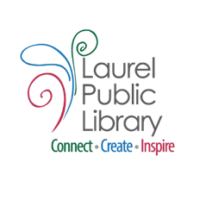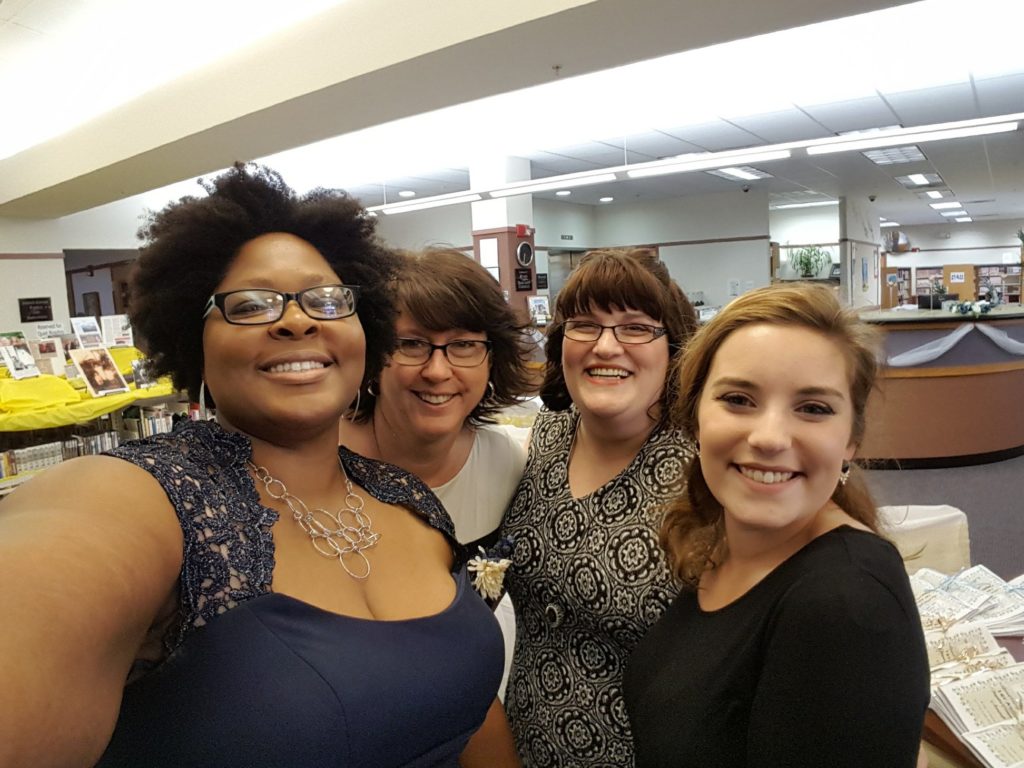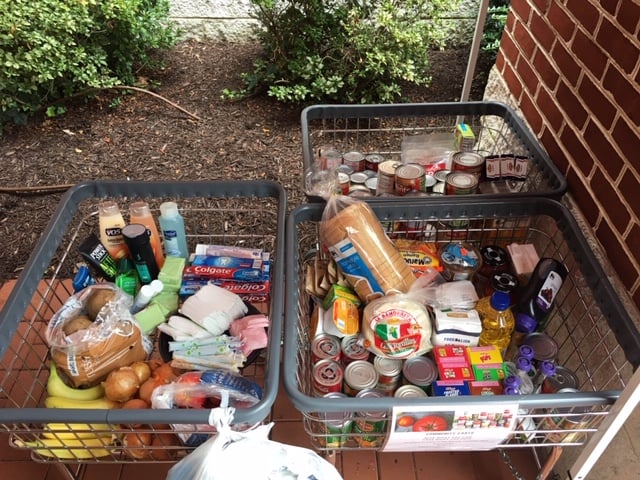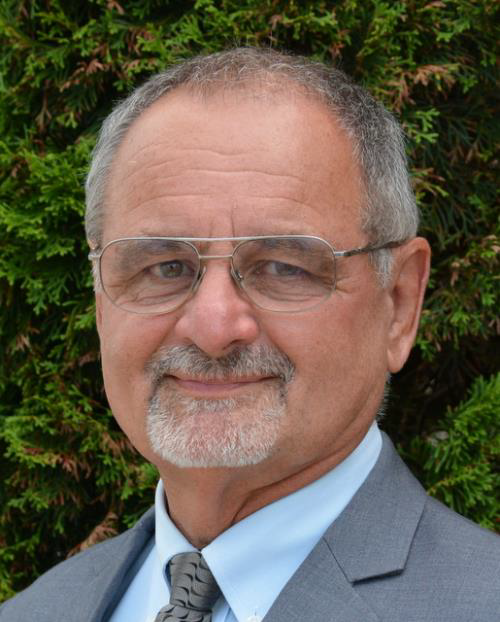Overall strategy: Saying ‘you’re valued’ to community
Community organizing involves more than spreading the word about your own library. It requires taking an interest in what others are doing in the community, and then working with others to transform the community.
Laurel Public Library does this work by sending thank you cards to organizations and individuals making a difference in the community. Over time, this small gesture grew a community awards ceremony held at the library wherein the library cemented its role as a critical convener and organizer of the community.
This awards ceremony in turn evolved into the ongoing “You’re Valued” Initiative, in which the library connects community organizations together and connects community members in need of specific services to the organizations able to meet those needs. Let’s learn more about how this work happens!
This case study is part of HEAL (Healthy Eating and Active Living) at the Library, funded by the U.S. Institute of Museum & Library Services (# RE-246336-OLS-20)
Key Take-Aways:
- Thanking those that make a difference.
- Understanding the needs of the community.
- Think Global, Act Local.
- Documenting as it happens for the long game.
Background on Laurel, Delaware
Laying the foundations internally
Laurel Public Library fosters an environment where the ideas and contributions of each individual are valued, and everyone is empowered to grow and share. The sense of being “in it together” spills over from the internal library organization to building relationships with the community at large.
The library’s community-first ethos is a priority when recruiting new staff. The library director, Wendy Roberts, recognized a passion for community organizing in Tameca Beckett and hired her. According to Tameca, Wendy gave her “a lab to work in to develop ideas” and encouraged her development through library conferences. Tameca remembered conference presenters “talking about maker spaces and digital media labs. And I’m in! … No one can tell me that our community shouldn’t be able to have this.” Tameca took action, earning state and national accolades for her successful partnership with the Laurel Ruritans, among others, to create a digital media lab at the library.
In 2016 Tameca became the library director, and re-oriented the library around community engagement and partnerships. She strived to institutionalize the collaborative culture based on her experiences “moving up the ranks” from part-time paraprofessional to library director. Grant writing was encouraged for all staff with an incentive approved by the library board in which 10% of the amount funded would be paid to the grant writer at the end of the fiscal year. The staff rose to the occasion, and when Tameca left the library in 2018, the new leadership team carried the baton forward.
Tameca knew that the foundations she had laid had become permanent during the total eclipse that occurred August 21, 2017. She said that the library had ordered all these sunglasses and planned a huge event:
“We ended up having hundreds if not thousands of people. We had the WBOC meteorologist come in before and give a whole presentation about it, just ramping up to the event.” She had to be away from the library on the day of the eclipse, “but I did not have a care in the world, because … I shared how I did everything, because it can’t ever be about me. They handled it brilliantly. I didn’t have to be there. And I knew I didn’t have to be there. If you pour into people, and allow them to be their authentic selves, and express themselves, and make them feel cherished and valued, and that [I as the director] am not taking all the credit for everything, then you don’t have to be there.”
Take Action: Start small and grow
Laurel Public Library used these documents (see example in side-bar) to thank community members, while also tying those “thank yous” back to the library’s mission. Note how the library’s slogan, “Connect. Create. Inspire.” is woven into the letter.
This simple strategy started small, with the library making a policy to thank any partnering organization.
They then extended the “thank you’s” by reading the local community’s weekly newspaper, and making note of organizations doing good work in the community. The library then thanked those doing that work. Wenona Phillips stated “We send letters and cards all throughout the year, and sometimes just because we all need that little note of cheer!” Wenona said it makes library staff feel good and makes partners feel good too.
This work culminated in an awards ceremony – the Inspire Community Awards – in which the library expressed its appreciation for all those individuals and organizations working to make Laurel the best place it can be.
Through these steps, the community’s perception of the library changed.
The October 2016 INSPIRE award ceremony highlights Laurel Public Library’s approach to building community partnerships. Non-profit leader Joyce Sessoms was among those honored at the awards ceremony. Joyce recalled in a 2020 interview how seeing community leaders together at the library transformed her understanding of what public librarians can do, in terms of community development. Joyce and many others now see the library as a critical community partner for any work focused on improving the community, including work related to Healthy Eating and Active Living (HEAL)!
Creating systems for building external collaboration
Collaboration is the primary element that allows Laurel Public Library to successfully promote Healthy Eating and Active Living (HEAL) in their community. Creating a culture of collaboration is driven by four factors:
- Thanking those that make a difference: To build their reputation as a community partner, Laurel Public Library started by showing appreciation. Through simple acts like sending letters to thank individuals and organizations that also strive to Connect, Create, and Inspire (the library’s motto), potential partners are embraced in the library’s community.
- Understanding the needs of the community: Laurel Public Library thinks creatively about collaborative solutions to support community needs, seeks to partner in all initiatives to more fully understand the issues, and over time builds a web of networks representing its diverse communities to address the needs.
- Think Global, Act Local: As the library collaborates locally, they also watch for state and national trends and funding opportunities, receiving support from such efforts, including those outside the world of librarianship, like the Harwood Institute. This vision recognizes that public librarianship crosses into many other sectors.
- Documenting as it happens for the long game: Being proactive with documentation is essential for partnerships and initiatives to multiply. Laurel Public Library maintains binders of information that enable staff to easily tell their story, communicate their impacts, and apply for grant funding.
Recognizing the work of community members in Laurel laid the foundation for the library to partner with various organizations on new initiatives. The library staff became aware of the experience and interests of potential partners and could better work toward their strengths, while partners learned that their efforts would be appreciated and celebrated throughout the community, inspiring a desire to do more joint projects.
After years of dedication, Laurel Public Library has formed many, many community partners. The following two stories illustrate how the library put these pieces together to make a difference in community health.
Dr. Tameca Beckett, Ed.D., on left in photo above. Also pictured: Gail Bruce, Wenona Phillips, and Abby Mitchell
Tameca’s library career grew out of personal experiences. As a mother with three young children, Tameca’s family would frequently bike or skate over to the Laurel Public Library. When she noticed a staff job posting at the library during one of her weekly visits in 2010, Tameca applied and became Circulation Supervisor.
As her career progressed, she earned her bachelor’s degree in Library Science at the University of Maine, Augusta, attended the Public Library Association Conference, earned her Master’s of Library & Information Science from San Jose State University, joined the board of the Association for Rural and Small Libraries, won numerous awards, and most recently earned her doctoral degree (Ed.D) in Educational Leadership at Delaware State University.
Where will it lead?
Success Story #1: Broad Creek Community Fitness Trail
The 4-H program, coordinated by the University of Delaware Cooperative Extension, became a partner around 2010. Local extension agent Dr. Bill McGowan had lived and worked in Laurel since the early 1980s, but only began thinking about the public library as a community partner decades later, when he learned of the Harwood Institute’s work. At the national level, the Harwood Institute promoted ideas about public librarians as “a potent force for change” in community development, inspiring local actions.
Based on Dr. McGowan’s new awareness of that national discourse, and his experience seeing the library represented in the community, he began to see the library as, in his words, “Instigators. I reached out to the library” then. As a result, a partnership formed with the library hosting 4-H activities. The two organizations worked together on a variety of issues, including teen engagement and community health.
With 4-H programming now based out of the library and Tameca Beckett promoted to Youth Services Librarian, a Teen Ambassador program was established, creating an in-house volunteer base for a variety of programming. This groundwork, and a supportive library administration, provided the necessary pieces for the Broad Creek Community Fitness Trail to emerge.

In 2014, the Laurel Public Library and their partners officially opened the “Broad Creek Community Fitness Trail: A 4-H Engaging Youth, Serving Community Project.”
In partnership with the 4-H program, middle and high school teens completed an 8-month service-learning project in which they selected a topic, engaged the community through a town forum and community meetings, and developed an action plan to address the issue. The selected topic was healthy weight and nutrition, and they decided to create a community fitness trail that includes exercise stations designed for a wide range of users, both in age and physical capabilities.
Tameca applied for funding to purchase the equipment, facilitated by the Extension’s connections with community health efforts in Delaware. A member of a faith-based organization recalled the trail project with the library “to put exercise stations in a local park. They got the grant. They got the equipment shipped in. I put people together to get it done. And it still is used today. That was one of the first and biggest things we did together.” The web of community partners that had grown together enabled the partners to tap into the goodwill of everyone from town government to faith-based organizations to get the job done.
Success Story #2: Food to Patrons
While the previous story focused on a specific initiative, this story instead focuses on how the library recognized a community need – food security – and then worked with partners over several years to develop multiple strategies to make a positive impact.
In the early 2010’s the library started offering cooking programs for adults, with grants written by an adult services librarian. Their impact on food security and literacy increased in 2017, when they started offering “Kids Cafe” summer lunches and after-school suppers, through a partnership with the Boys & Girls Clubs of Delaware and the U.S. Department of Agriculture (USDA). Laurel Public Library strove to adapt this national feeding program to the particularities of the community, working with partners to provide food and education, which led to a collaboration with the Laurel School District’s parallel efforts, aligning the programs to reach the most individuals in need.
Despite these efforts food insecurity still existed in Laurel Public Library’s service area, which encompassed large agricultural areas. Wanting to do more, library director Gail Bruce and her staff developed the Farm to Patron Table initiative, creating another layer of partnerships for the library, this time with the agricultural sector outside of the town itself. They secured shopping carts from partners, which were seeded with produce and food items by local farmers, food producers, and community members, to install at the library. A third cart filled with non-perishable foods and hygiene products was added to serve additional needs.
When the pandemic arrived, the library needed to pivot. With approval from the funders, the cooking classes moved online and the carts moved outside. On June 22, 2021, they announced “Our building may be closed, but we will be serving ‘Grab and Go’ lunches and snacks Monday – Friday at 12 … [and] on Fridays we will be offering weekend bags in addition to lunch.” The library continued this service and also shared information about other meal sites coordinated by the school district.
On July 31, 2020, the library announced that “Starting Monday we will have carts at the front of the library as part of our ‘Farm to Patron Table’ program. If you have excess produce from your garden or produce stand please consider adding it to the cart – even if it is just a few items, every bit helps! If you are in need, please take what you can use. Share the bounty and help those in need in our community.”
The Farm to Patron initiative dovetails with a parallel effort to install hydroponic gardens inside the building, supported by the library’s participation in OCLC/WebJunction’s Small Libraries Create Smart Spaces.
Introducing library partner Dr. William “Bill” McGowan, Ed.D
Bill McGowan has lived in Laurel since 1980, working for much of his career in the fields of rural community development for the University of Delaware Extension.
In 2009 he became a Certified Coach for Harwood Institute for Public Innovation, the organizational partner of the American Library Association’s Libraries Transforming Communities initiative.
Based on that training, Bill started seeing public libraries as key community partners, establishing close working relationships with the library, particularly around the 4-H program, which is part of the University of Delaware Extension.
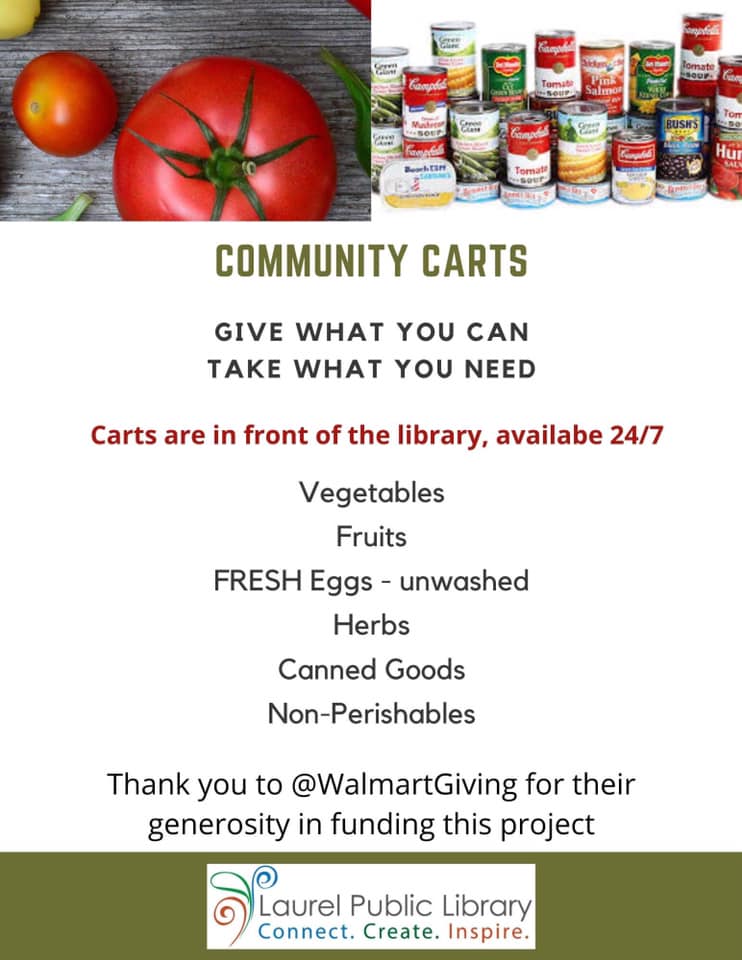
The Farm to Patron initiative emerged from a grant the library received in 2019. The original idea was to host a weekly indoor farmer’s market, using produce gleaned from local farms. The library would pair that with 6 weeks of healthy cooking classes that would be easy and inexpensive. If patrons completed the course they would receive a library bag filled with utensils, spices, etc., and they would also be entered into a drawing for a crock pot or insta-pot.
Then the pandemic hit. The library couldn’t have in person programs, so had to pivot and came up with the Community Food Carts, which are still available and supported. The library was also able to offer live virtual classes that patrons could participate in online, receiving their bag full of cooking supplies at the end.
Action Steps: Getting Started and Conclusions
These two stories demonstrate the four factors that undergird Laurel Public Library’s successful collaborations to promote Healthy Eating and Active Living (HEAL).
- Thanking those that make a difference.
- Understanding the needs of the community.
- Think Global, Act Local. Documenting as it happens for the long game.
Action Steps:
- Discover organizations making a difference in your community (Each Thursday when the weekly newspaper arrives, library staff read it, make notes of who to send a letter to, and then copy the article)
- Send letters of appreciation to recognize others’ efforts (Divide up the list up, and give them some sample scripts to make it easier for them to write the letters)
- Keep track of your growing list of partners and supporters (Keep a database where staff put in all those they recognize, and send a Holiday time card to)
How could you recognize other community organizations like Laurel Public Library did? Please use the Take Action tools to start building relationships and get the conversations going with your current and future community partners!

